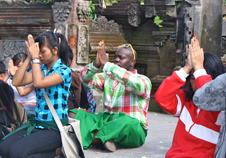Using the arts to foster cultural learning

When David Royster arrived in Indonesia in February for his first international co-op, he felt well prepared to teach a course on global citizenship, civic engagement and cultural celebration at the Bali Global Boarding School. The international affairs and political science combined major had already spent time in Southeast Asia, and had worked with international students as an admissions counselor for Northeastern University’s Global Pathways program.
But despite his confidence and his carefully thought out teaching plan, the first challenge he faced was totally unexpected.
“Right away, I realized that the level of English the students had was nowhere near where it needed to be for such broad and complex subjects,” said Royster, who will start his junior year this fall. “I had to think fast and come up with a new game plan.”
The school – which is run by the Bali Global Foundation – allows high school students to complete their academic studies while developing real-world skills for a career in restaurant or hotel management.
Royster set out to develop an entirely new curriculum. To reach his students, Royster decided to leverage his appreciation for theater and drama in the classroom.
Dramatic films such as “West Side Story” and Baz Luhrmann’s “Romeo + Juliet” – which tell similar stories in different contexts – allowed Royster to use concrete examples to increase his students’ English skills while teaching them about multiculturalism and the similarities between cultures.
“In a culture in which discrimination and racism are not often discussed, it proved difficult to explore the complex topics of global citizenship and civics through vague ideas and concepts,” Royster explained. “Instead, these films fueled discussions about the Puerto Rican migration to the United States of the 1950s and the issues of discrimination that followed.”
Royster had traveled to Southeast Asia two years before and was drawn to return to the region, though he hadn’t considered returning for a co-op until a meeting with Ketty Rosenfeld, Northeastern’s director of international co-op, who spoke highly of the Bali Institute.
In the four months Royster spent in Bali, he said his students’ English improved markedly. Royster said he plans to go abroad for his third and final co-op next year.
“I love working with students, I love sharing culture and ideas and I love learning,” Royster said. “Co-op gives you the chance to test out and try things. I appreciate how it helps students who don’t know what they want to do, try out things and come closer to an idea.”




